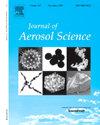在线探测气溶胶相中纳米颗粒比表面积的非线性光学技术
IF 3.9
3区 环境科学与生态学
Q2 ENGINEERING, CHEMICAL
引用次数: 0
摘要
本研究对气溶胶相中黑碳颗粒(也称为烟尘)和其他类型的纳米颗粒产生的非线性光学(NLO)效应(如二次谐波发生(SHG))进行了量化和分析。并提出了它在测量气溶胶比表面积方面的潜力。SHG 是一种非线性光学现象,通常用于生物科学和基础物理学,在研究表面敏感现象方面具有很大的潜力。它有两种形式:相干 SHG 和非相干 SHG,也称为超瑞利散射(HRS)。虽然在溶液中的颗粒或位于液滴表面的有机分子上已有应用,但在没有任何 SHG 增强添加剂的情况下,气溶胶相中的固体纳米颗粒自然诱发的 SHG 尚未被检测或量化。本研究旨在缩小这一差距,方法是将特性良好的纳米气溶胶喷射暴露在具有高峰值脉冲能量的飞秒激光下,从而诱发 NLO 现象。实验是在一种创新的光学装置中进行的,该装置可以分析在时间、波长和角度上分辨的 NLO 响应,从而能够将 SHG 与激光丝化等其他现象隔离开来。为了量化产生的信号功率,对光学装置进行了校准,并对其进行了优化,以获得高灵敏度,避免其自身光学元件产生 NLO。结果证实,烟尘颗粒、DEHS 液滴和电弧产生的碳纳米颗粒都具有 SHG 特性,其强度比静态光散射小 7 个数量级以上。SHG 尤其取决于聚合体和/或单体的大小。另一方面,烟尘诱导的 SHG 似乎与有机碳或基本碳的含量无关。实验还表明,检测到的 NLO 信号随颗粒表面积的增加而线性增加,与颗粒形状或成分无关。最后,NLO 信号的角度响应与线性散射有着本质区别。由于角度响应的各向同性,观测到的 SHG 信号可能是非相干的,因此与超雷利散射有关。这些发现显示了非线性光学的潜力,特别是对气溶胶比表面进行现场量化的潜力。这些信息对于评估气溶胶的毒性至关重要,因此,本研究成果可以为基于激光的新型气溶胶诊断技术开辟道路。本文章由计算机程序翻译,如有差异,请以英文原文为准。
Non-linear optics for an online probing of the specific surface area of nanoparticles in the aerosol phase
In the present study the generation of non-linear optical (NLO) effects, such as second harmonic generation (SHG), by black carbon particles, also named soot, and by other types of nanoparticles in aerosol phase is quantified and analysed. Its potential for measuring the specific surface area of an aerosol is put forward. SHG is a Non Linear Optical phenomenon that is typically used in biosciences and fundamental physics and has shown to have large potential for the investigation of surface sensitive phenomena. It exists in two forms, coherent SHG and incoherent SHG, also named Hyper Rayleigh Scattering (HRS). While applications on particles in solution or organic molecules located on the surface of droplets exist, the SHG naturally induced by solid nanoparticles in aerosol phase without any SHG enhancing additive has neither been detected nor quantified yet. The present work aims at narrowing this gap by exposing a jet of well-characterized nanoaerosols to a femtosecond laser featuring high peak pulse energies allowing to induce NLO phenomena. The experiments are carried out in an innovative optical setup allowing to analyse the NLO response resolved in time, wavelength and angle, thus having the capability to isolate SHG from other phenomena, such as laser filamentation. The optical setup was calibrated in order to quantify the generated signal power and optimized in order to have a high sensitivity and in order to avoid NLO generation from its own optical elements. The results confirm that soot particles, as well as DEHS droplets and arc generated carbon nanoparticles, feature SHG at intensities that are more than 7 orders of magnitude smaller than that of static light scattering. SHG depends in particular on aggregate and/or monomer size. On the other hand, SHG induced by soot does not seem to depend on the organic or elementary carbon content. The experiments also show that the detected NLO signal increases linearly with particle surface area, independently of the particle shape or composition. Finally, the angular response of NLO signal is fundamentally different from that of linear scattering. Due to the isotropic nature of the angular response, the observed SHG signal is probably non-coherent and thus related to Hyper Raleigh Scattering. These findings show the potential of non-linear optics, in particular to quantify in situ the specific surface of an aerosol. Giving access to this information which is crucial in the evaluation of toxicity of aerosols, the present work can thus give way to a new class of laser based diagnostics for aerosols.
求助全文
通过发布文献求助,成功后即可免费获取论文全文。
去求助
来源期刊

Journal of Aerosol Science
环境科学-工程:化工
CiteScore
8.80
自引率
8.90%
发文量
127
审稿时长
35 days
期刊介绍:
Founded in 1970, the Journal of Aerosol Science considers itself the prime vehicle for the publication of original work as well as reviews related to fundamental and applied aerosol research, as well as aerosol instrumentation. Its content is directed at scientists working in engineering disciplines, as well as physics, chemistry, and environmental sciences.
The editors welcome submissions of papers describing recent experimental, numerical, and theoretical research related to the following topics:
1. Fundamental Aerosol Science.
2. Applied Aerosol Science.
3. Instrumentation & Measurement Methods.
 求助内容:
求助内容: 应助结果提醒方式:
应助结果提醒方式:


